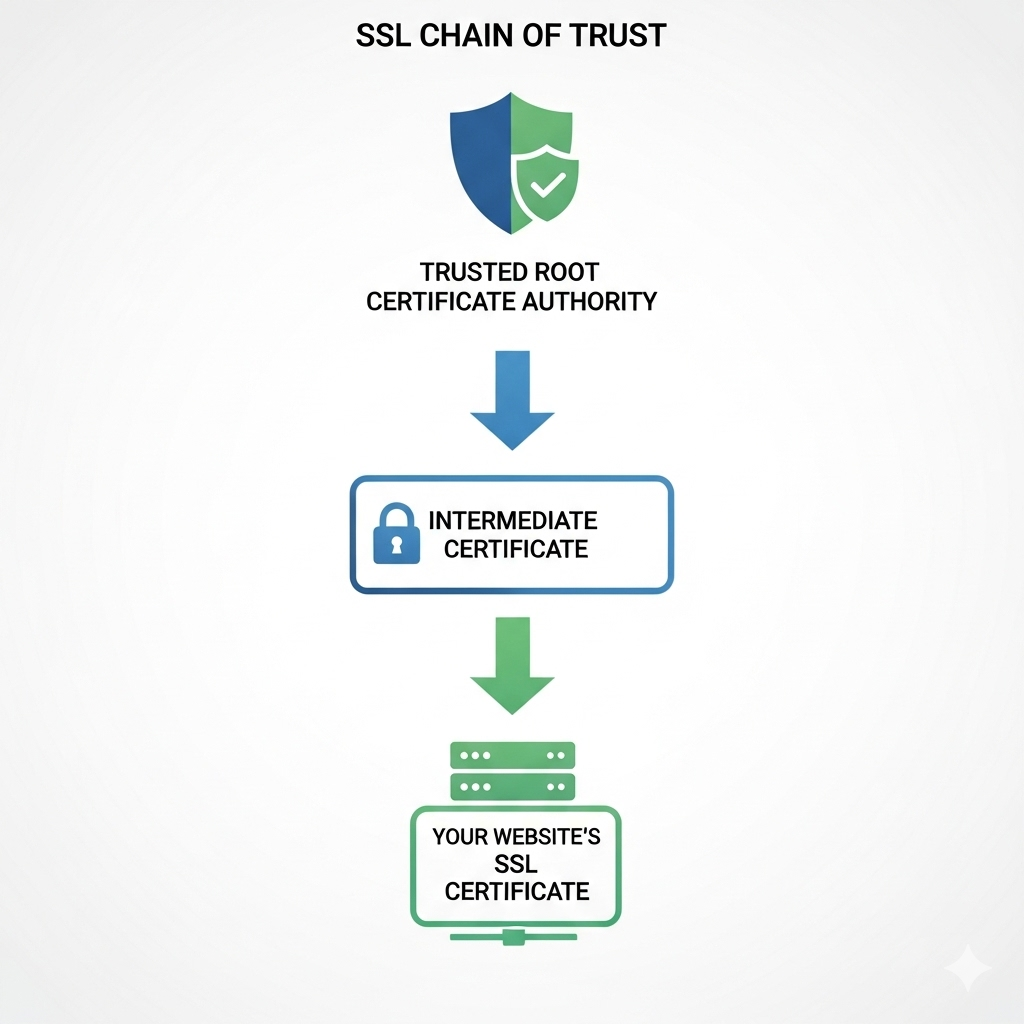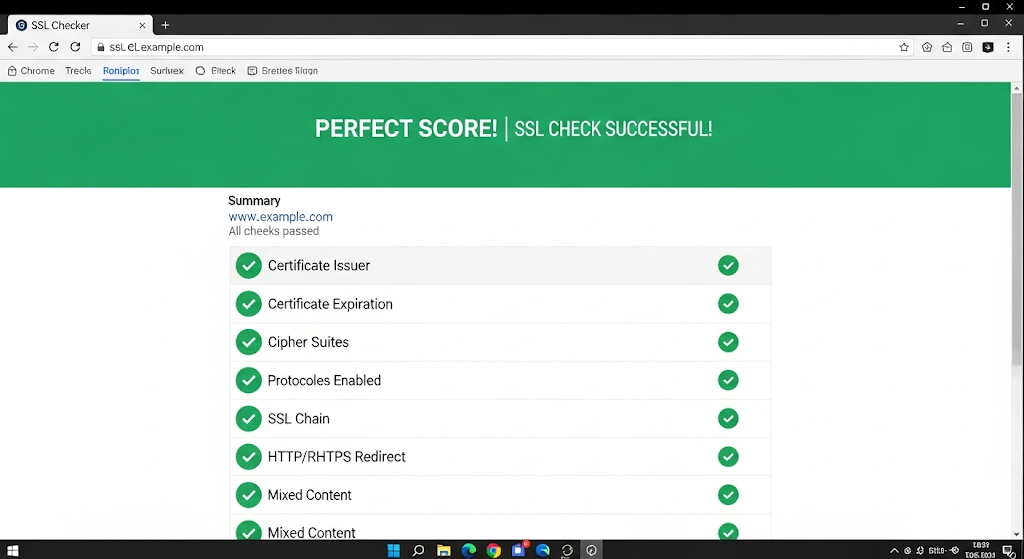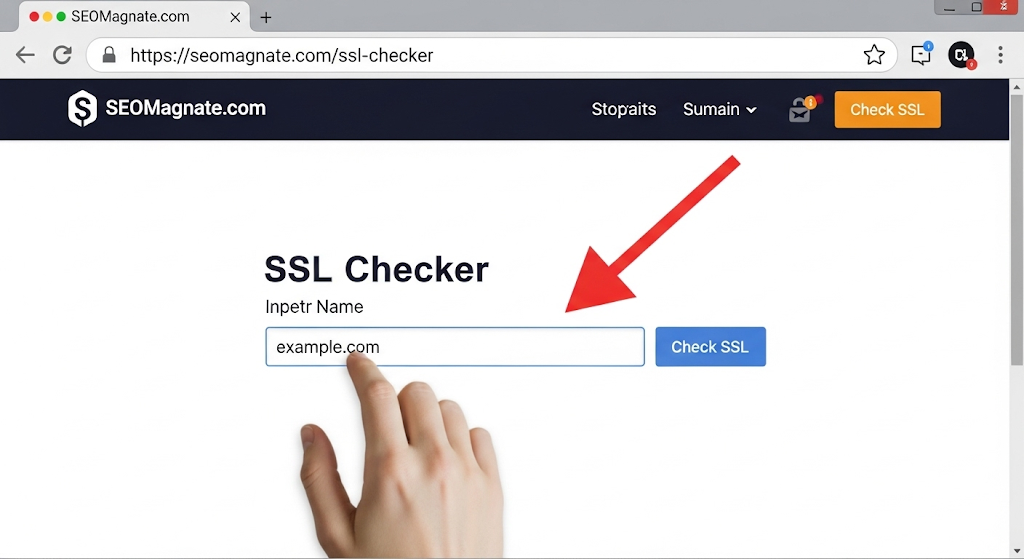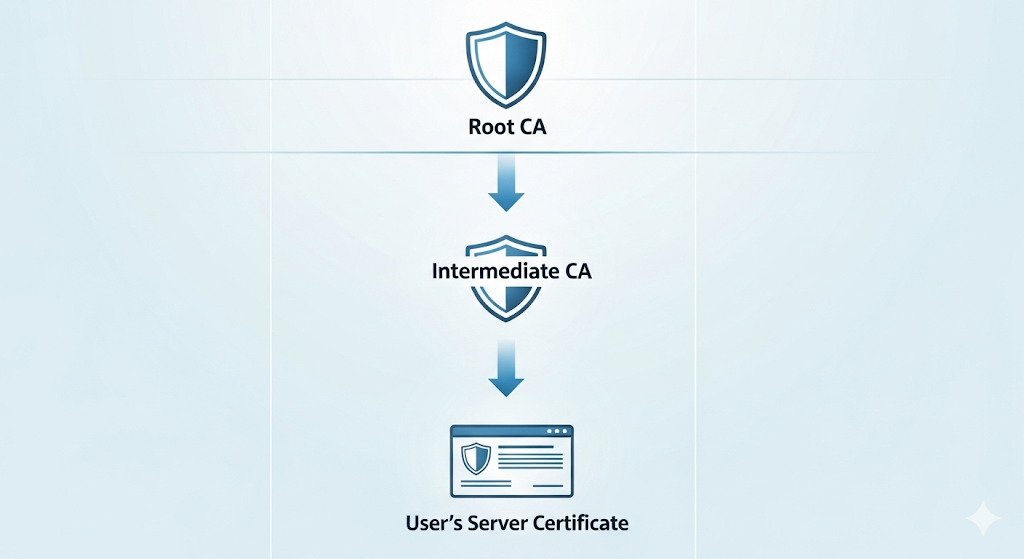SSL Checker
Instantly check your SSL certificate for errors. Our free online SSL checker provides a complete security audit, including expiry dates, chain, and configuration.
Share on Social Media:
The Ultimate Guide to Verifying Your Website's Security with Our SSL Checker Online Tool

Is your website secure? It’s a simple question, but the answer can be the difference between a trusted brand and a visitor-repelling liability. The padlock in the address bar is just the beginning; a single misconfiguration in your SSL/TLS certificate can expose your users to risk, tank your SEO rankings, and destroy your credibility.
That's why we've created the most comprehensive guide to website security, complete with our powerful and free ssl checker online tool. In the next few minutes, you’ll not only learn how to instantly diagnose your SSL certificate's health but also understand what the results mean and exactly how to fix any issues that arise.
What is an SSL Certificate and Why is it Non-Negotiable in 2025?
SSL (Secure Sockets Layer), and its modern successor, TLS (Transport Layer Security), are the cryptographic protocols that create a secure, encrypted connection between a user's web browser and your website's server. Think of it as a digital passport and a secure, armored tunnel for all the data that passes between your visitors and your site.
An SSL certificate does three critical things:
Encrypts Data: It scrambles sensitive information like login credentials, credit card numbers, and personal details, making them unreadable to hackers and eavesdroppers.
Authenticates Identity: It verifies that your website is who it claims to be, preventing attackers from creating a fraudulent "clone" of your site to steal user data.
Builds Trust: It provides the visual cue of the padlock icon and the "https:// " prefix in the browser's address bar, signaling to visitors that your site is safe to use.
In 2025, not having a valid SSL certificate is a red flag for both users and search engines. Google has used HTTPS as a ranking signal for years, and browsers like Chrome will actively warn users away from non-secure sites.
The High Cost of an Invalid SSL Certificate
A broken or expired SSL certificate is more than just a technical glitch. It's a business problem with serious consequences:
Loss of Sales and Leads: A "Not Secure" warning will scare away potential customers before they even see your products.
Damaged Brand Reputation: Security is a cornerstone of trust. A visible security error tells the world you're not taking your users' safety seriously.
Lower Search Engine Rankings: Google penalizes sites that are not secure, making it harder for customers to find you.
Compliance and Legal Risks: For many industries, data encryption is a legal requirement (e.g., GDPR, HIPAA). An SSL failure can lead to hefty fines.
Introducing the SEO Magnate SSL Checker: Your Instant Security Auditor
Manually checking your SSL certificate is a complex, time-consuming process. Our free online tool automates this entire audit, giving you a comprehensive report in seconds.
How to Use Our SSL Checker: A 3-Step Walkthrough
Using our tool is as simple as it gets. Here’s a step-by-step guide to checking your website's SSL certificate.
Step 1: Enter Your Domain Name
In the input box above, type or paste the hostname of the website you want to check. You don't need to include https:// or http://.
Example: www.seomagnate.com
Step 2: Initiate the Scan
Click the "Check SSL" button. Our tool will securely connect to your web server (just like a regular browser) and begin a deep analysis of your SSL/TLS configuration.
Step 3: Analyze Your Results
Within seconds, you'll see a detailed report. The report is designed to be easy to understand, with clear green checkmarks for passes and red warnings for failures.

Decoding Your SSL Checker Results: A Plain-English Guide
A good SSL checker tool doesn't just give you data; it gives you answers. Here’s a breakdown of the key elements of our report and what they mean for your website's security.
Certificate Details: The Who, What, and When
This section covers the basics of your SSL certificate.
Common Name (CN): The primary domain name the certificate was issued for. If this doesn't match the URL in the address bar, browsers will show a "name mismatch" error.
Subject Alternative Names (SANs): A list of all the other domain and sub-domain names covered by this single certificate. Modern certificates use SANs to secure multiple variations of a domain (e.g., seomagnate.com and www.seomagnate.com).
Issuer: The Certificate Authority (CA) that issued your certificate (e.g., Let's Encrypt, DigiCert, Sectigo). This is the trusted third party that vouches for your identity.
Validity Period (Issued & Expires On): The date the certificate was issued and, most importantly, the date it expires. An expired certificate is one of the most common—and easily avoidable—causes of security warnings. Our tool will clearly show you how many days you have left.
Certificate Chain: The Unbroken Chain of Trust
Your SSL certificate doesn't work in isolation. It's part of a "chain of trust" that links your domain's certificate all the way back to a globally trusted "root" certificate.
Root Certificate: Pre-installed in all major browsers and operating systems. It's the ultimate source of trust.
Intermediate Certificate(s): These act as a bridge between your server's certificate and the root certificate.
Server Certificate (or Leaf Certificate): The one issued specifically for your domain.
Our tool checks to ensure this chain is complete and correctly installed. A "broken chain" is a common problem where an intermediate certificate is missing from the server configuration.
Server Configuration: The Technical Nitty-Gritty
This is where we analyze the technical setup of your server to ensure it's using the latest and most secure protocols and ciphers.
TLS Protocol Support: We check which versions of the TLS protocol your server supports. TLS 1.2 and TLS 1.3 are the modern, secure standards. Older protocols like SSLv2, SSLv3, and TLS 1.0/1.1 have known vulnerabilities and should be disabled.
Cipher Suites: These are the specific encryption algorithms your server uses to create the secure connection. We check for strong, modern cipher suites and flag any that are weak or outdated.
HTTP Strict Transport Security (HSTS): A security header that tells browsers to only communicate with your site using HTTPS. This prevents certain types of attacks.
Common SSL Certificate Errors and How to Fix Them (Troubleshooting Guide)
Seeing a red warning on your SSL check can be stressful, but most issues have straightforward fixes. Here's a guide to the most common problems and how to solve them.
Error: "Certificate Expired"
This is the most frequent SSL error. It happens when you forget to renew your certificate.
How to Fix:
Identify your Certificate Provider: This is the "Issuer" in our SSL report.
Log in to your Provider's Dashboard: This could be your hosting provider (like GoDaddy, Bluehost) or a dedicated CA (like DigiCert).
Follow the Renewal Process: Most providers have a simple "renew" button. You may need to generate a new Certificate Signing Request (CSR).
Install the New Certificate: Once renewed, you'll get new certificate files. Follow your host's instructions to upload and install them.
Pro-Tip: Use a service like Let's Encrypt that offers automatic renewals.
Error: "Common Name Mismatch"
This error means the domain name on the certificate doesn't match the one the user is visiting.
How to Fix:
Check for www vs. non-www: The most common cause is a certificate issued only for seomagnate.com when a user visits www.seomagnate.com (or vice-versa).
Verify All Subdomains: Ensure all subdomains you use (e.g., blog.seomagnate.com, shop.seomagnate.com) are listed as Subject Alternative Names (SANs) on your certificate.
Get the Right Certificate: You may need to reissue your certificate to include all necessary SANs or purchase a Wildcard certificate (e.g., *.seomagnate.com) to cover all subdomains.
Error: "Incomplete Certificate Chain"
This means a browser can't link your certificate back to a trusted root because an intermediate certificate is missing.
How to Fix:
Download the Correct Intermediate Certificate: Your certificate provider will have a "certificate bundle" (often a .ca-bundle file) available for download. This contains all the necessary intermediate certificates.
Install the Bundle on Your Server: The method for this varies by web server (Apache, Nginx, etc.). Your hosting provider's documentation will have specific instructions. For Apache, you'll use the SSLCertificateChainFile directive. For Nginx, you'll combine your certificate and the bundle into a single file.
Rerun the SSL Check: Use our tool again to confirm the chain is now complete.
Error: "Server is Using Weak Protocols or Ciphers"
This is a server configuration issue where your server is allowing outdated and insecure connections.
How to Fix:
This is an advanced fix. If you're not a system administrator, you should contact your hosting provider or a developer for assistance.
Edit Your Server's Configuration File: You'll need to modify the SSL/TLS configuration for your web server (e.g., httpd.conf for Apache, nginx.conf for Nginx).
Disable Old Protocols: You'll specify the protocols to use, explicitly disabling SSLv3, TLS 1.0, and TLS 1.1. The recommended setting is TLSv1.2 and TLSv1.3.
Specify a Strong Cipher Suite: You'll provide a specific string of recommended ciphers, prioritizing modern, secure algorithms. Mozilla provides an excellent SSL Configuration Generator to help with this.
Restart Your Web Server: After saving the changes, you must restart your web server for them to take effect.
Beyond the Basics: Advanced SSL/TLS Concepts
For those who want to go deeper, here are some advanced concepts our tool helps you evaluate.
Certificate Transparency (CT)
Certificate Transparency is an open framework that logs all issued SSL certificates. This makes it possible to detect maliciously or mistakenly issued certificates. Our checker verifies that your certificate is publicly logged in trusted CT logs.
OCSP Stapling
The Online Certificate Status Protocol (OCSP) is a way for browsers to check if a certificate has been revoked by the issuer before it has expired. OCSP Stapling is a performance enhancement where your server periodically gets a signed "good" status from the CA and "staples" it to the SSL handshake. This is faster and more private for the user. Our tool checks if your server has this feature enabled and working correctly.
Key Exchange and Signature Algorithm
We analyze the strength of the cryptographic keys used in your certificate. Modern standards require RSA keys of at least 2048 bits or the more efficient Elliptic Curve Cryptography (ECC) keys. We also ensure your certificate is signed with a secure algorithm like SHA-256, not the outdated SHA-1.
SSL Certificate Types: Which One is Right for You?
Not all SSL certificates are created equal. They vary in validation level and the number of domains they can secure.
| Certificate Type | Validation Level | Best For | Typical Cost |
|---|---|---|---|
| Domain Validated (DV) | Basic (verifies domain control) | Blogs, personal sites, portfolios | Free - $50/year |
| Organization Validated (OV) | Medium (verifies domain & company) | Business websites, e-commerce | $50 - $200/year |
| Extended Validation (EV) | Highest (verifies full legal entity) | Large e-commerce, banks, finance | $200 - $1000+/year |
| Wildcard | DV or OV | Securing a domain and all its subdomains | $100 - $500/year |
| Multi-Domain (SAN) | DV, OV, or EV | Securing multiple different domain names | Varies by number of domains |

As a professional deeply entrenched in the digital security landscape, I've come to appreciate the critical role that SSL Certificate Checker tools play in maintaining the integrity and trustworthiness of websites. In this comprehensive exploration, I'll delve into the various facets of these indispensable tools, highlighting their versatility, leading options available for enhanced security, and the paramount importance of regular SSL checks.
Introduction to SSL Certificate Checker Tools
Exploring the versatility of SSL Certificate Checker tools, it's evident that these utilities are not just about verifying the presence of SSL/TLS certificates but also about assessing the quality and security posture of these certificates. They serve as the first defense in identifying discrepancies or lapses in a website's encryption mechanisms. Identifying leading SSL Certificate Checker tools for enhanced security is crucial for any web administrator or security professional. These tools help ensure that the encryption is up to par and maintains compliance with the evolving web security standards.
Understanding SSL/TLS Certificates
SSL Certificate Checker tools ensure your website's encryption is current and foundational to safeguarding the data exchange between a user's browser and the website server. This protection is critical in preventing man-in-the-middle attacks and ensuring that sensitive information remains confidential. Utilizing SSL Certificate Checker tools to avoid security compliance issues is equally important. With regulations and standards such as PCI DSS mandating strong encryption, these tools help identify potential compliance risks.
The Importance of Regular SSL Checks
The significance of regular checks with SSL Certificate Checker tools cannot be overstated. These tools ensure website security and trustworthiness by continuously monitoring the validity and configuration of SSL/TLS certificates. Regular checks prevent unexpected expirations, which can lead to website downtime and a loss of consumer trust, potentially impacting the bottom line for businesses.
Features to Look for in SSL Certificate Checker Tools
Ease of use and an intuitive interface are paramount when selecting an SSL Certificate Checker tool. These features ensure that even those without deep technical expertise can effectively monitor and manage SSL/TLS certificates. Comprehensive reporting features for thorough analysis are also crucial, providing detailed insights into the certificate's configuration, expiration, and vulnerabilities.
DigiCert SSL Certificate Checker
DigiCert SSL Certificate Checker is an essential tool for secure web transactions. It leads with reliability, offering in-depth analysis and immediate notifications on any issues detected with a website's SSL/TLS certificate. This tool exemplifies the top-tier standards that SSL Certificate Checker tools should aspire to.
Qualys SSL Labs' SSL Test
Qualys SSL Labs' SSL Test sets the SSL Certificate Checker tools benchmark. It evaluates SSL security comprehensively, offering a detailed score that helps administrators better understand their website's security posture. This tool is a testament to how SSL Labs leads SSL Certificate Checker tools in evaluating and improving SSL/TLS security.
SSL Checker by SSL Shopper
SSL Shopper's SSL Checker simplifies SSL troubleshooting for all users, making it a top choice among SSL Certificate Checker tools for its reliability and user-friendly interface. It provides a quick and easy way to verify that an SSL certificate is installed correctly and functioning as expected.
GeoTrust SSL Checker
GeoTrust SSL Checker is a premier choice among SSL Certificate Checker tools, optimizing website security with comprehensive analysis capabilities. It's an essential tool for anyone looking to ensure their website's encryption is robust and trustworthy.
Comodo SSL Analyzer
Comodo SSL Analyzer stands out among SSL Certificate Checker tools for its detailed evaluation of SSL/TLS certificates. Ensuring your website's SSL certification is up-to-date and configured correctly is essential, and safeguarding against vulnerabilities is critical.
GlobalSign SSL Checker
GlobalSign SSL Checker ensures comprehensive analysis, making it a premier SSL Certificate Checker tool. It offers detailed insights into the SSL/TLS certificate's status, helping maintain high web security standards.
Symantec CryptoReport
Symantec CryptoReport elevates security with advanced SSL Certificate Checker tools, leading with innovation. It provides in-depth analysis and reporting on the SSL/TLS certificates, ensuring they meet the highest security standards.
SSL Checker by Wormly
Wormly's SSL Checker ensures comprehensive validation of SSL certificates, making it a top choice for reliability among SSL Certificate Checker tools. It offers detailed insights into the certificate's validity and configuration, ensuring optimal website security.
High-Tech Bridge SSL Security Test
High-Tech Bridge SSL Security Test leads SSL Certificate Checker tools with comprehensive evaluation capabilities. It ensures a thorough assessment of SSL/TLS certificates, setting a high standard for security analysis.
GoDaddy SSL Certificate Checker
GoDaddy SSL Certificate Checker ensures website security and trustworthiness, standing out for its reliability among top SSL Certificate Checker tools. It provides a quick and easy way to verify the status and configuration of SSL/TLS certificates.
Why Accuracy Matters in SSL Checking
Accurate SSL Certificate Checker tools prevent security vulnerabilities by ensuring that SSL/TLS certificates are correctly issued, configured, and haven't been tampered with. Reliable SSL Certificate Checker tools ensure website trustworthiness by providing a secure environment for users, which is critical for maintaining consumer confidence and compliance with security standards.
Detecting SSL Certificate Mismatches
SSL Certificate Checker tools are crucial in identifying expired or invalid SSL certificates. Regularly using these tools ensures website security and avoids the negative implications of using an outdated or misconfigured certificate.
Identifying Expired SSL Certificates
Exploring top SSL Certificate Checker tools for expired certificate detection is vital for maintaining uninterrupted website availability and security. Regularly utilizing these tools helps preempt potential security risks associated with expired certificates.
Assessing Certificate Chain for Trustworthiness
Identifying top SSL Certificate Checker tools for robust security assessment is crucial for evaluating the effectiveness of SSL/TLS certificates in establishing a trusted connection. These tools are key in verifying certificate chains, ensuring that a trusted authority issues them and is not compromised.
Evaluating SSL Cipher Strength
SSL Certificate Checker tools are instrumental in identifying weak ciphers in SSL configurations. Using these tools ensures compliance with robust encryption standards, safeguarding against vulnerabilities that attackers could exploit.
Understanding SSL Certificate Grades
SSL Certificate Checker tools ensure your website's security grade meets the highest standards. These tools provide an accurate evaluation of SSL strength, offering insights into areas that may require improvement to enhance security.
The Role of SSL in SEO Rankings
SSL Certificate Checker tools enhance website trust for better SEO rankings by ensuring that the site is secure, which is a factor considered by search engines in their ranking algorithms. Regularly using these tools ensures SEO integrity by maintaining a safe and trustworthy site.
Automating SSL Certificate Monitoring
Enhancing security with automated SSL Certificate Checker tools streamlines the process of monitoring and managing SSL/TLS certificates. This precision ensures that certificates are always up-to-date and configured correctly, minimizing the risk of security breaches.
Mitigating Risks with Timely SSL Renewal
SSL Certificate Checker tools ensure timely renewal to avoid downtime and the associated security risks. Using these tools reduces the likelihood of encountering security vulnerabilities due to expired or improperly configured certificates.
The Future of SSL Certificate-Checking Tools
Evolving SSL Certificate Checker tools enhance website security verification processes, ensuring they keep pace with the latest standards and threats. Top SSL Certificate Checker tools increasingly incorporate advanced features and automation to streamline compliance and enhance security.
Frequently Asked Questions (FAQ)
1. How can I check my SSL certificate's expiry date?
Our SSL checker online tool is the fastest way. Simply enter your domain, and the "Validity Period" in the report will show you the exact expiration date and how many days are remaining.
2. What's the difference between SSL and TLS?
TLS (Transport Layer Security) is the modern, more secure version of SSL (Secure Sockets Layer). While people still use the term "SSL" colloquially, all modern secure connections use the TLS protocol.
3. Can I get an SSL certificate for free?
Yes! Certificate Authorities like Let's Encrypt offer free, trusted Domain Validated (DV) SSL certificates. Most modern web hosting providers have integrated Let's Encrypt, allowing you to install a free SSL certificate with a single click.
4. How long does an SSL certificate last?
The maximum validity period for a publicly trusted SSL certificate is currently 398 days (about 13 months). Let's Encrypt certificates are valid for 90 days but are typically renewed automatically every 60 days.
5. What is a "self-signed" certificate?
A self-signed certificate is one that is signed by the website's own private key instead of a trusted Certificate Authority. Browsers do not trust these certificates and will show a major security warning to users. They are only suitable for internal testing or development environments.
6. How do I force my website to use HTTPS?
After installing your SSL certificate, you need to set up a 301 redirect from HTTP to HTTPS. This can be done by editing your .htaccess file (on Apache servers) or your server block configuration (on Nginx). Most hosting control panels also have a "Force HTTPS" toggle.
7. What does "SSL Handshake Failed" mean?
This is a generic error that means the browser and server couldn't establish a secure connection. The most common cause is a protocol or cipher suite mismatch (e.g., the browser requires TLS 1.2 but the server only supports the outdated TLS 1.0). Our tool can help diagnose these server configuration issues.
8. Is a Wildcard SSL certificate worth it?
If you have a main domain and multiple subdomains (e.g., www.site.com, blog.site.com, shop.site.com), a Wildcard certificate (*.site.com) is often more cost-effective and easier to manage than buying a separate certificate for each one.
9. What is an SSL "mixed content" error?
This happens on an HTTPS page when some of its resources (like images, scripts, or stylesheets) are still being loaded over an insecure HTTP connection. Browsers will often block this insecure content and may show a broken padlock icon. You need to ensure all resource URLs on your site use https://.
10. How often should I check my SSL certificate?
It's good practice to run a check with a tool like ours at least once a quarter, and always after a server migration, configuration change, or certificate renewal to ensure everything is working perfectly.
Your Website's Security is Too Important to Guess
In a digital world built on trust, a valid and properly configured SSL certificate is your first and most important handshake with every visitor. Don't leave your website's security to chance. Regular checks and proactive maintenance are key to protecting your users, your reputation, and your revenue.
Bookmark this page and use our free ssl checker online tool at https://seomagnate.com/ssl-checker as your go-to resource for instant, comprehensive, and easy-to-understand SSL audits.
About the Author
As a leading expert in web security and search engine optimization, the author has spent over a decade helping businesses fortify their online presence. This article is a reflection of deep, hands-on experience in diagnosing and resolving complex SSL/TLS configuration issues for both small businesses and enterprise-level websites, ensuring they meet the highest standards of security and search engine compliance.

